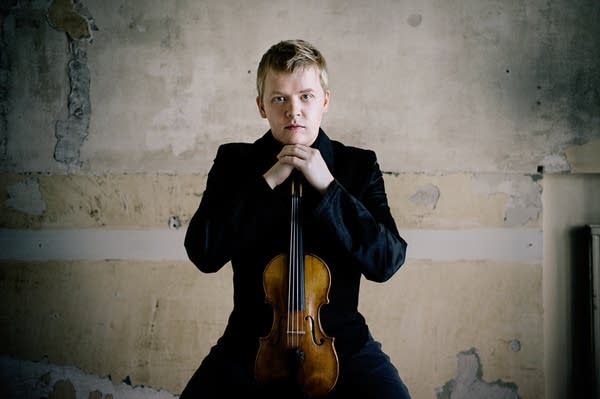Mischa Santora smiles when asked whether he knew anything about the art of beat boxing before hatching his latest collaborative project with rapper Carnage the Executioner.
"About three or four years ago I knew nothing," he replies. "But then I worked with this guy, and he has taught me a lot about the origins of beat box and using your mouth to make all these drumming sounds."
Santora is a classical musician by trade. He has wide experience conducting ensembles such as the Minnesota Orchestra, Saint Paul Chamber Orchestra and Boston Ballet. He also is a musician of uncommonly wide musical sympathies.

Four years ago, Santora founded the Minneapolis Music Company (MMC), an organization dedicated to creating projects where musical genres are mixed and performers from different art forms mesh their creativity together in new collaborations.
Santora's latest MMC creation is From Bach to Beat Box, an ambitious project that involves tossing the music of J.S. Bach into a hungry arena of performers including Terrell Woods (aka Carnage the Executioner), folk-classical string duo the OK Factor, and the classically trained jazz pianist Samuel Rosenstone.
These are, Santora readily admits, "musicians from vastly different styles and backgrounds." What are they supposed to do with the snippets of Bach's tunes and rhythms that they are given to work with?
Run with them, is the short answer — bend them, shape them, reorder them, make something new out of the raw materials of Bach's musical imagination.
"Improvisation and spontaneity used to be part of what we now call classical music," Santora says. "Somewhere along the way, I feel like we have lost a lot of that."
The idea behind From Bach to Beat Box, he explains, is to rediscover the thrills and spills of improvisation — essentially, making music up on the spot — and communicate the sense of creativity in the raw that it encapsulates.
"The skill of improvisation is not talked about or trained in classical music conservatories; it's not part of the skill set," he says. "That is a tremendous loss, because many of the greatest composers were also the greatest improvisers of their times — that includes Bach, Mozart, Schumann and Chopin."
What started off as noodlings on a harpsichord or piano, Santora argues, often developed later into fully formed musical ideas that found their way into the finished compositions of the great classical masters.

"A lot of the improvisations Bach did were later incorporated into works like his Fantasias," he says. "So I was thinking, is there a way to bring that skill back in?"
"From Bach to Beat Box is a kind of homage to J.S. Bach, the rock star of improvisation back in the 18th century. It's also an attempt to find a bridge between Bach and other contemporary styles that are improvisatory in nature."
Rekindling the creative spark that comes from flipping ideas around between musicians in a live performance is not an easy thing to do, but Santora feels that he has found exactly the right musicians to do it.
"I've brought together four highly skilled musicians, and we've had a couple of rehearsals and chats, and it's been just amazing what springs up," he says.
One thing that gradually emerged in the rehearsal process was an outline structure for the hourlong performance.
"We're going to start with a piece by Bach, the prelude to the G major Cello Suite," Santora explains. "Out of that, we'll take musical elements and make it jazzy, beat box, hip-hop or folksy, with all four musicians playing together. And the Bach Suite will be heard again at the end."
Improvisation can be fun, of course, but for Santora its significance runs deeper, to the source of where music comes from in the first place.
"Music started with somebody making up a rhythm, beating two logs together, and somebody making up a melody. But as music became more complex and structural, the issue of notation — writing it down — became more important," he says.

"So now we have symphonies and operas, and all kinds of amazing things. But I feel that has come at a price, and we have in a way lost our roots, and our spontaneity."
From Bach to Beat Box is a reconnection with those roots, with seed material supplied from the classical tradition. For Santora, it is also important that the concert will not be given in a typical classical venue, but in the more informal setting of the Bryant-Lake Bowl in Minneapolis.
"A hundred years ago and earlier concerts were very different," Santora says. "People used to clap after a flute solo in the middle of a piece if they liked it. A whole movement of a symphony would be repeated if the audience applauded enough.
"So to say categorically that it is wrong to express your appreciation during a concert when you like something is historically incorrect. And it puts people off."
From Bach to Beat Box will, Santora says, be a different, more audience-friendly experience.
"If you're hungry, you can eat during the concert; if you're thirsty, you can drink," he promises. "These are top-notch performers, and it'll be a fun event."
To buy tickets for From Bach to Beat Box, click here.
Love the music?
Show your support by making a gift to YourClassical.
Each day, we’re here for you with thoughtful streams that set the tone for your day – not to mention the stories and programs that inspire you to new discovery and help you explore the music you love.
YourClassical is available for free, because we are listener-supported public media. Take a moment to make your gift today.











